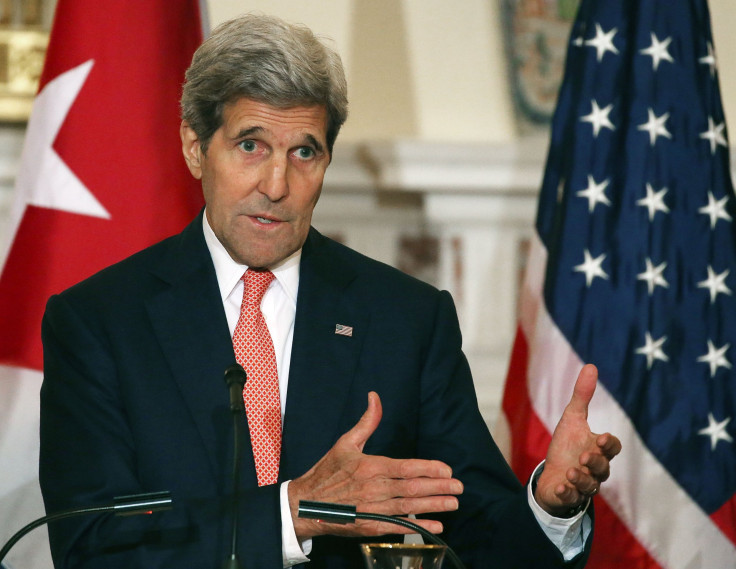John Kerry To Meet Persian Gulf Allies In Qatar To Assure US Cooperation To ‘Push Back’ Against Iran

A historic deal between the West and Iran over the latter’s nuclear program has been reached, but tensions over Tehran’s influence in the Middle East persist, prompting U.S. Secretary of State John Kerry to reassure Washington’s allies in the region of its support.
In an interview with pan-Arab newspaper al-Sharq al-Awsat, published Wednesday, Kerry said that he would soon meet with Arab officials in Qatar to restore their confidence in the U.S. government’s cooperation to “push back” against Iran. Kerry’s announcement comes as oil-rich Gulf nations accuse Tehran of interfering in Arab conflicts in a bid to heighten its influence in the region, Reuters reported. U.S. allies like Sunni-majority Saudi Arabia have voiced their concerns over the nuclear deal with Iran, a Shia power.
“I will be traveling to Doha in the next couple of weeks to meet with the whole (Gulf Cooperation Council),” Kerry told the newspaper. “I think we can persuade them both that by being more effective in our counter-push as well as through the restraints we have, they will be significantly strengthened going forward.”
The GCC is made up of regional powers such as Saudi Arabia, the United Arab Emirates, Bahrain, Kuwait, Oman and Qatar.
Kerry’s diplomatic move comes after U.S. President Barack Obama called a summit with Gulf Arab leaders at Camp David in May, ahead of last week's historic deal with Iran, which aims to curb Iran's nuclear ambitions in return for a lifting of crippling economic sanctions. Although the leaders of Bahrain and Saudi Arabia snubbed the summit, Kerry said the effort was aimed at convincing the region's leaders that the deal was in their interest.
“The whole reason for Camp David was to bring people together around in an organizational effort to push back against Iran,” Reuters quoted Kerry as saying. “We have negotiated a nuclear deal for the simple reason that we believe if you are going to push back against Iran, it's better to push back against an Iran without a nuclear weapon than with one.”
Meanwhile, Abbas Araqchi, Tehran's lead negotiator, said Wednesday that the country will not accept curbs on its nuclear program beyond 10 years. According to him, any attempt to extend sanctions after they expire in 10 years would breach the landmark deal.
“The U.N. Security Council’s resolution says clearly that the timeframe of agreement is 10 years, and Iran’s case will be closed in the Security Council after that,” Reuters quoted Araqchi as saying. “If the U.S. and any other member of P5+1 say they want to adopt a new resolution after 10 years allowing sanctions to be re-imposed, it is the breach of Vienna agreement and has no credibility.”
Kerry said Tuesday that Iran, despite the nuclear deal, could continue to pose a threat to stability in the Middle East, with its conventional weapons. However, he added, an effectively organized group of Arab powers could counter any potential threat.
“Obviously, there are a lot of conventional weapons in the region … [But] if they organize themselves correctly, all of the Arab States have an untapped potential that is very, very significant to be able to push back against any of these activities,” Kerry told Al Arabiya News Channel.
© Copyright IBTimes 2024. All rights reserved.






















